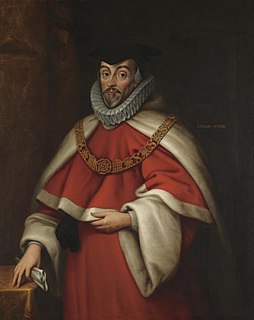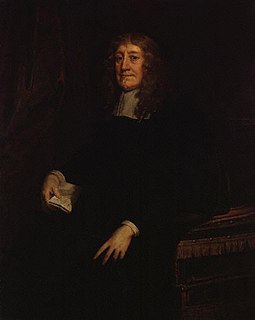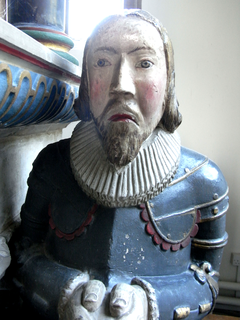Related Research Articles
Stephen Marshall was an English Nonconformist churchman. His sermons, especially that on the death of John Pym in 1643, reveal eloquence and fervour. The only "systematic" work he published was A Defence of Infant Baptism, against John Tombes.

Sir Nicholas Hyde was Lord Chief Justice of England.

The Oxford Parliament, also known as the Mongrel Parliament was the Parliament assembled by Charles I of England for the first time on 22 January 1644 and adjourned for the last time on 10 March 1645, with the purpose of being an instrument of the Royalist war campaign.

Edward Littleton, 1st Baron Lyttleton, from Munslow in Shropshire, was a Chief Justice of North Wales. He was descended from the judge and legal scholar, Thomas de Littleton. His father, also Edward, had been Chief Justice of North Wales before him.

Sir Geoffrey Palmer, 1st Baronet, SL was an English lawyer and politician.

Sir Robert Hyde (1595–1665) was an English judge and Chief Justice of the King's Bench.
Zouch Tate (1606–1650) was an English Member of Parliament.
Sir William James Ingram, 1st Baronet was Managing Director of The Illustrated London News and a Liberal politician who sat in the House of Commons in three periods between 1878 and 1895.
Sir Henry Bellingham, 1st Baronet was an English lawyer and politician who sat in the House of Commons from 1625 to 1626. He supported the Royalist cause in the English Civil War.

Sir Francis Popham (1573–1644) of Wellington, Somerset and Littlecote, Berkshire, was an English soldier and landowner who was elected a Member of Parliament nine times, namely for Somerset (1597), Wiltshire (1604), Marlborough (1614), Great Bedwin (1621), Chippenham 1624, 1625, 1626, 1628–29), and for Minehead (1640–1644).
Sir John Bramston, the younger, was an English lawyer and politician who sat in the House of Commons from 1660 to 1679. The son of Sir John Bramston, the elder and his first wife Bridget Moundeford, daughter of Thomas Moundeford, he was educated at Wadham College, Oxford, and called to bar at Middle Temple in 1635. In 1660 he was elected to the Convention Parliament for the county of Essex and again in the Cavalier Parliament of 1661. He frequently acted as chairman of committees of whole House of Commons of England and was returned to parliament for Maldon in 1679 and 1685. He left an autobiography.
John Stephens was an English politician who sat in the House of Commons at various times between 1645 and 1660.

Sir Lawrence Hyde II was an English lawyer who was Attorney-general to the consort of King James I, Anne of Denmark. He sat in the House of Commons at various times between the years 1584 and 1611.
Sir William Uvedale was an English politician who sat in the House of Commons at various times between 1614 and 1645. He supported the Royalist cause in the Civil War.
William White was an English politician who sat in the House of Commons at various times between 1645 and 1660.
Lawrence Hyde (1593–1643) was an English lawyer and politician who sat in the House of Commons in two parliaments between 1624 and 1629.
Sir William Smyth, 1st Baronet was an English politician who sat in the House of Commons at various times between 1640 and 1679. He supported the Royalist cause in the English Civil War.
Sir Christopher Calthorpe KB was an English Member of Parliament.
Robert Hyde of Hindon, Wiltshire and Heale, Woodford, Wiltshire was an English politician who sat in the English House of Commons between 1677 and 1707 and in the British House of Commons from 1708 to 1722.

Sir John Strode, of the Middle Temple, London and Chantmarle, Cattistock, Dorset, was an English MP for Bridport in 1621 and 1625.
References
- ↑ John. P. Ferris, HYDE, Hon. Edward (1645-65), of the Middle Temple, London. in The History of Parliament: the House of Commons 1660-1690 (1983).